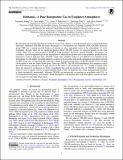Methanol—A Poor Biosignature Gas in Exoplanet Atmospheres
Author(s)
Huang, Jingcheng; Seager, Sara; Petkowski, Janusz J; Zhan, Zhuchang; Ranjan, Sukrit
DownloadPublished version (4.148Mb)
Publisher with Creative Commons License
Publisher with Creative Commons License
Creative Commons Attribution
Terms of use
Metadata
Show full item recordAbstract
Biosignature gas research has been growing in recent years thanks to next-generation space- and ground-based telescopes. Methanol (CH3OH) has many advantages as a biosignature gas candidate. First, CH3OH's hydroxyl group (OH) has a unique spectral feature not present in other anticipated gases in the atmospheres of rocky exoplanets. Second, there are no significant known abiotic CH3OH sources on terrestrial planets in the solar system. Third, life on Earth produces CH3OH in large quantities. However, despite CH3OH's advantages, we consider it a poor biosignature gas in the atmospheres of terrestrial exoplanets due to the enormous production flux required to reach its detection limit. CH3OH's high water solubility makes it very difficult to accumulate in the atmosphere. For the highly favorable planetary scenario of an exoplanet with an H2-dominated atmosphere orbiting an M5V dwarf star, we find that only when the column-averaged mixing ratio of CH3OH reaches at least 10 ppm can we detect it with the James Webb Space Telescope (JWST). The CH3OH bioproduction flux required to reach the JWST detection threshold of 10 ppm must be of the order of 1014 molecules cm−2 s−1, which is roughly three times the annual O2 production on Earth. Considering that such an enormous flux of CH3OH is essentially a massive waste of organic carbon—a major building block of life, we think this flux, while mathematically possible, is likely biologically unattainable. Although CH3OH can theoretically accumulate on exoplanets with CO2- or N2-dominated atmospheres, such planets' small atmospheric scale heights and weak atmospheric signals put them out of reach for near-term observations.
Date issued
2022Department
Massachusetts Institute of Technology. Department of Earth, Atmospheric, and Planetary SciencesJournal
Astrophysical Journal
Publisher
American Astronomical Society
Citation
Huang, Jingcheng, Seager, Sara, Petkowski, Janusz J, Zhan, Zhuchang and Ranjan, Sukrit. 2022. "Methanol—A Poor Biosignature Gas in Exoplanet Atmospheres." Astrophysical Journal, 933 (1).
Version: Final published version